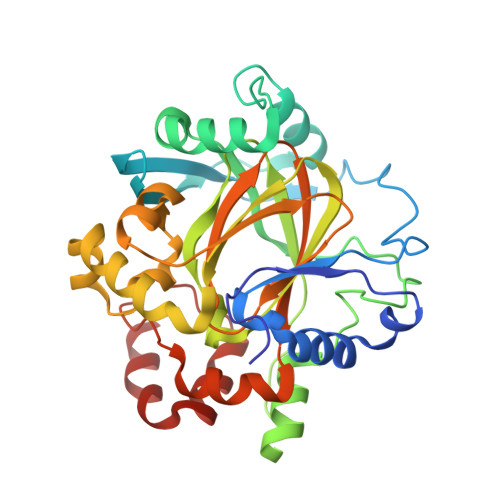Cell Penetrant Inhibitors of the KDM4 and KDM5 Families of Histone Lysine Demethylases. 2. Pyrido[3,4-d]pyrimidin-4(3H)-one Derivatives.
Westaway, S.M., Preston, A.G., Barker, M.D., Brown, F., Brown, J.A., Campbell, M., Chung, C.W., Drewes, G., Eagle, R., Garton, N., Gordon, L., Haslam, C., Hayhow, T.G., Humphreys, P.G., Joberty, G., Katso, R., Kruidenier, L., Leveridge, M., Pemberton, M., Rioja, I., Seal, G.A., Shipley, T., Singh, O., Suckling, C.J., Taylor, J., Thomas, P., Wilson, D.M., Lee, K., Prinjha, R.K.(2016) J Med Chem 59: 1370-1387
- PubMed: 26771203
- DOI: https://doi.org/10.1021/acs.jmedchem.5b01538
- Primary Citation of Related Structures:
5FP7 - PubMed Abstract:
Following the discovery of cell penetrant pyridine-4-carboxylate inhibitors of the KDM4 (JMJD2) and KDM5 (JARID1) families of histone lysine demethylases (e.g., 1), further optimization led to the identification of non-carboxylate inhibitors derived from pyrido[3,4-d]pyrimidin-4(3H)-one. A number of exemplars such as compound 41 possess interesting activity profiles in KDM4C and KDM5C biochemical and target-specific, cellular mechanistic assays.
- Epinova Discovery Performance Unit, Medicines Research Centre, GlaxoSmithKline R&D , Stevenage SG1 2NY, U.K.
Organizational Affiliation:





















